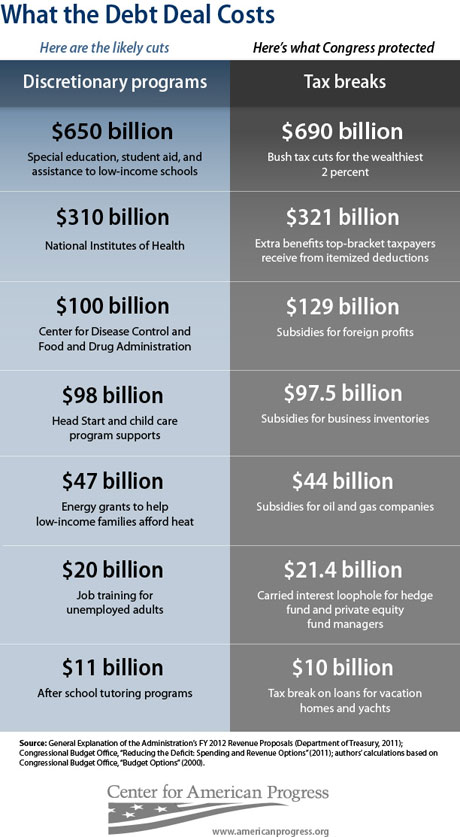The compromise reached between Congress and President Obama last week requires $1 trillion in cuts from federal budget discretionary programs and an agreement to identify another $1.5 trillion in deficit reduction by Thanksgiving. But there is no agreement yet on closing tax breaks for the highest income Americans or ending tax subsidies that pad the bottom line of the most profitable companies —special tax breaks that were declared off the table by Republicans in the recent round of negotiations. Our chart details the choices still to be made.
The agreement struck between Congress and President Obama to raise the debt ceiling requires a two-step deficit reduction process. First Congress imposes caps on discretionary spending programs that amount to combined cuts of $1 trillion over the next 10 years. These cuts are likely to affect areas such as housing, job training, and education programs.
Then, by November 23, three Democrats and three Republicans from each chamber—the so-called Super Committee—are charged with finding $1.5 trillion in additional deficit reduction. In theory, everything is on the table, including defense spending; entitlements such as Medicaid, Medicare, and Social Security; and revenues. If the Super Committee can agree on a deficit reduction package, then the full Congress would have until December 1 to approve them, or else a “sequester” would go into effect, cutting defense and reimbursements to Medicare providers.
House Republicans continue to stonewall on revenues. But some Senate Republicans have signaled a willingness to cut special tax breaks and subsidies. And poll after poll has shown that vast majorities of Americans—in fact strong majorities of Republicans—support a balanced approach that includes cuts to spending programs and special tax breaks. It remains to be seen whether our political system will be able to produce the balanced result the American people clearly want.
Our most important fundraising appeal of the year
December is the most critical time of year for Truthout, because our nonprofit news is funded almost entirely by individual donations from readers like you. So before you navigate away, we ask that you take just a second to support Truthout with a tax-deductible donation.
This year is a little different. We are up against a far-reaching, wide-scale attack on press freedom coming from the Trump administration. 2025 was a year of frightening censorship, news industry corporate consolidation, and worsening financial conditions for progressive nonprofits across the board.
We can only resist Trump’s agenda by cultivating a strong base of support. The right-wing mediasphere is funded comfortably by billionaire owners and venture capitalist philanthropists. At Truthout, we have you.
We’ve set an ambitious target for our year-end campaign — a goal of $250,000 to keep up our fight against authoritarianism in 2026. Please take a meaningful action in this fight: make a one-time or monthly donation to Truthout before December 31. If you have the means, please dig deep.
 Click here to view larger.
Click here to view larger.